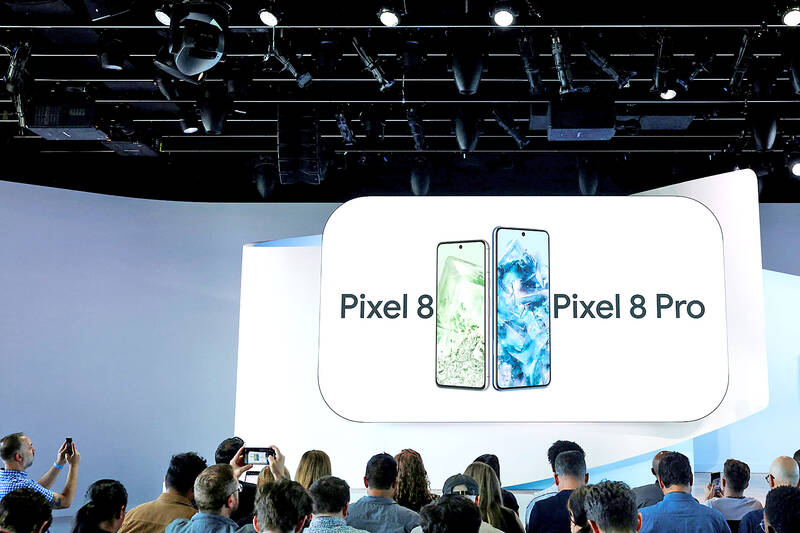Google plans to manufacture its flagship Pixel 8 smartphone in India, Google chief executive officer Sundar Pichai said on Thursday, joining a growing list of global technolgy companies limiting their supply chains’ dependence on China.
Pichai’s announcement follows US rival Apple Inc’s release last month of its latest iPhone, including units made in India, as technology giants target the South Asian nation’s fast-expanding market and abundant supply of cheap skilled labor.
“We shared plans at #GoogleforIndia [event on Thursday] to manufacture Pixel smartphones locally and expect the first devices to roll out in 2024,” Pichai wrote on X.

Photo: Reuters
Pichai added that Google appreciated the “support for Make in India” — a flagship policy of Indian Prime Minister Narendra Modi’s government, offering faster business clearances and financial incentives for manufacturing goods in the nation.
New Delhi has ramped up its production and exports of mobile phones and other electronic goods since the scheme was introduced.
India’s mobile phone exports almost doubled to US$8.5 billion year-on-year in 2022-2023, official figures showed.
Google senior vice president Rick Osterloh said that the firm sees “an even greater opportunity to make Pixel smartphones available to more people” in India.
“In recent years, India has established itself as a truly world-class hub for manufacturing, resulting in a thriving environment for businesses to flourish,” Osterloh said in a statement.
The company intends to “start with the Pixel 8, and will partner with international and domestic manufacturers to produce Pixel smartphones locally,” the statement said.
India, which is home to the second-highest number of smartphone users in the world after China, has set a target of producing about US$300 billion of local electronics and smartphones by 2025-2026.

Vincent Wei led fellow Singaporean farmers around an empty Malaysian plot, laying out plans for a greenhouse and rows of leafy vegetables. What he pitched was not just space for crops, but a lifeline for growers struggling to make ends meet in a city-state with high prices and little vacant land. The future agriculture hub is part of a joint special economic zone launched last year by the two neighbors, expected to cost US$123 million and produce 10,000 tonnes of fresh produce annually. It is attracting Singaporean farmers with promises of cheaper land, labor and energy just over the border.

US actor Matthew McConaughey has filed recordings of his image and voice with US patent authorities to protect them from unauthorized usage by artificial intelligence (AI) platforms, a representative said earlier this week. Several video clips and audio recordings were registered by the commercial arm of the Just Keep Livin’ Foundation, a non-profit created by the Oscar-winning actor and his wife, Camila, according to the US Patent and Trademark Office database. Many artists are increasingly concerned about the uncontrolled use of their image via generative AI since the rollout of ChatGPT and other AI-powered tools. Several US states have adopted

A proposed billionaires’ tax in California has ignited a political uproar in Silicon Valley, with tech titans threatening to leave the state while California Governor Gavin Newsom of the Democratic Party maneuvers to defeat a levy that he fears would lead to an exodus of wealth. A technology mecca, California has more billionaires than any other US state — a few hundred, by some estimates. About half its personal income tax revenue, a financial backbone in the nearly US$350 billion budget, comes from the top 1 percent of earners. A large healthcare union is attempting to place a proposal before

KEEPING UP: The acquisition of a cleanroom in Taiwan would enable Micron to increase production in a market where demand continues to outpace supply, a Micron official said Micron Technology Inc has signed a letter of intent to buy a fabrication site in Taiwan from Powerchip Semiconductor Manufacturing Corp (力積電) for US$1.8 billion to expand its production of memory chips. Micron would take control of the P5 site in Miaoli County’s Tongluo Township (銅鑼) and plans to ramp up DRAM production in phases after the transaction closes in the second quarter, the company said in a statement on Saturday. The acquisition includes an existing 12 inch fab cleanroom of 27,871m2 and would further position Micron to address growing global demand for memory solutions, the company said. Micron expects the transaction to